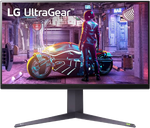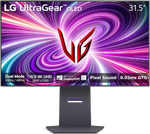A comparison of specs, key information, reviews, and best pricing from top retailers
Last updated -- hours ago | Report incorrect information
What we think

The PerfectRec monitor team Learn more
Updated April 22, 2024·
If budget is a concern and you mainly focus on competitive gaming, the LG 32GQ850 with its high refresh rate and quick response time would be a good fit. However, if you’re open to a higher investment for a premium watching experience and more vibrant colors, particularly for HDR gaming and media consumption, the LG 32GS95UE with superior contrast and color depth is the better choice. It's also better suited for print photo editing. Keep in mind, though, that if image clarity for detailed work or text quality for reading and productivity is your priority, neither of these might be the best option. Give Feedback
this description is based on the product variant with some specs and product variant with some specs. At the time of writing, the variant with some specs cost some dollars and the variant with some specs cost some dollars.
Advantages of the LG 32GQ850 (IPS)
- The LG 32GQ850 (IPS) has no clear advantages over the LG 32GS95UE (W-OLED).
Advantages of the LG 32GS95UE (W-OLED)
- Best in class for casual gaming
- Good for productivity
- Very good for media consumption
- Good image clarity
- Best in class contrast
- Best in class response time
Key differences
Casual Gaming
5.8


9.7
2560 x 1440
RESOLUTION
3840 x 2160
260Hz
REFRESH RATE
240Hz
1000:1
NATIVE CONTRAST
Inf:1
150 nits
SDR PEAK BRIGHTNESS
275 nits
600 nits
HDR PEAK BRIGHTNESS
Unknown
98.0 %
DCI-P3 COLOR GAMUT
98.5 %
Matte
COATING
Matte
The LG 32GS95UE (W-OLED) is best in class for casual gaming, while the LG 32GQ850 (IPS) is poor.
Competitive Gaming
5.2


6.2
260Hz
REFRESH RATE
240Hz
8.0 ms
TOTAL RESPONSE TIME
0.3 ms
48 - 260 Hz
VARIABLE REFRESH RATE
48 - 240 Hz
No
STROBING / BFI
No
150 nits
SDR PEAK BRIGHTNESS
275 nits
The LG 32GS95UE (W-OLED) is only fair for competitive gaming, while the LG 32GQ850 (IPS) is poor.
Productivity
5.0


7.0
2560 x 1440
RESOLUTION
3840 x 2160
93 PPI
PIXELS PER INCH
140 PPI
Yes
ADJUSTABLE STAND
Yes
Matte
COATING
Matte
The LG 32GS95UE (W-OLED) is good for productivity, while the LG 32GQ850 (IPS) is poor.
Media Consumption
5.3


8.5
2560 x 1440
RESOLUTION
3840 x 2160
1000:1
NATIVE CONTRAST
Inf:1
150 nits
SDR PEAK BRIGHTNESS
275 nits
600 nits
HDR PEAK BRIGHTNESS
Unknown
Matte
COATING
Matte
The LG 32GS95UE (W-OLED) is very good for media consumption, while the LG 32GQ850 (IPS) is poor.
Cost
$718


$1,100
$0
$500
$1,000
$1,500
$2,000
The LG 32GQ850 (IPS) has a price of $718 and the LG 32GS95UE (W-OLED) costs $1,100.
HDR Gaming and Media Consumption
No


Yes
The LG 32GQ850 (IPS) is not suitable for HDR gaming and media consumption while the LG 32GS95UE (W-OLED) is suitable for HDR gaming and media consumption.
Digital Photo Editing
Yes


No
The LG 32GQ850 (IPS) is suitable for digital photo editing while the LG 32GS95UE (W-OLED) is not suitable for digital photo editing.
Key similarities
HDR Video Editing and Color Grading
No


No
Both the LG 32GQ850 (IPS) and LG 32GS95UE (W-OLED) are not suitable for HDR video editing and color grading.
Print Photo Editing
Yes


Yes
Both the LG 32GQ850 (IPS) and LG 32GS95UE (W-OLED) are suitable for print photo editing.
Give feedback
We’re constantly working to improve.
How the LG 32GQ850 (IPS) and the LG 32GS95UE (W-OLED) compare to other monitors
Spec Comparison
| LG 32GQ850 (IPS) | LG 32GS95UE (W-OLED) |
GENERAL | |||
|---|---|---|---|
| Price | |||
$718 | $1,100 | ||
Screen Size | |||
Screen Size | 32" | 32" | |
Resolution | |||
Resolution | 2560 x 1440 | 3840 x 2160 | |
Screen Type | |||
Screen Type | LED | OLED | |
Screen Sub-type | |||
Screen Sub-type | IPS | W-OLED | |
Local Dimming Zones | |||
Local Dimming Zones | 16 | N/A | |
COLOR, CONTRAST & BRIGHTNESS | |||
|---|---|---|---|
Native Contrast | |||
Native Contrast | 1000:1 | Inf:1 | |
SDR Peak Brightness | |||
SDR Peak Brightness | 150 nits | 275 nits | |
HDR Peak Brightness | |||
HDR Peak Brightness | 600 nits | Unknown | |
Suitable for HDR Gaming and Media Consumption | |||
Suitable for HDR Gaming and Media Consumption | No | Yes | |
sRGB Color Gamut | |||
sRGB Color Gamut | 135 % | 98.5 % | |
MOTION CHARACTERISTICS | |||
|---|---|---|---|
Total Response Time | |||
Total Response Time | 8 ms | 0.3 ms | |
Variable Refresh Rate | |||
Variable Refresh Rate | 48 - 260 Hz | 48 - 240 Hz | |
Strobing / BFI | |||
Strobing / BFI | No | No | |
Persistence Blur Score | |||
Persistence Blur Score | 8.3/10 | 8/10 | |
Ghosting Score | |||
Ghosting Score | 7.6/10 | 9.9/10 | |
TEXT & IMAGE CLARITY | |||
|---|---|---|---|
Pixels Per Inch | |||
Pixels Per Inch | 93 PPI | 140 PPI | |
Coating | |||
Coating | Matte | Matte | |
Text Clarity Score | |||
Text Clarity Score | 6.3/10 | 6.9/10 | |
Image Clarity Score | |||
Image Clarity Score | 6.3/10 | 8/10 | |
PORTS & CONNECTIVITY | |||
|---|---|---|---|
HDMI 1.4 Ports | |||
HDMI 1.4 Ports | 0 | 0 | |
HDMI 2.0 Ports | |||
HDMI 2.0 Ports | 0 | 0 | |
HDMI 2.1 Ports | |||
HDMI 2.1 Ports | 1 | 2 | |
Micro HDMI Ports | |||
Micro HDMI Ports | 0 | 0 | |
DisplayPort 1.2 Ports | |||
DisplayPort 1.2 Ports | 0 | 0 | |
Give feedback
We're constantly perfecting our model
More comparisons for you
Compare LG 32GQ850 (IPS) vs. Innocn 27M2V (IPS MiniLED)
VS
Compare LG 32GQ850 (IPS) vs. Acer X34V (QD-OLED)
VS
Compare LG 32GQ850 (IPS) vs. AOC AG276QZD (W-OLED)
VS
Compare LG 32GS95UE (W-OLED) vs. Asus XB273U F (IPS)
VS
Compare LG 32GS95UE (W-OLED) vs. MSI MPG 491CQP (QD-OLED)
VS
Compare LG 32GS95UE (W-OLED) vs. Gigabyte CO49DQ (QD-OLED)
VS
FAQs
Why trust us
This information was produced and vetted by the PerfectRec monitors team. We are a product research and recommendation organization that meticulously reviews and evaluates the latest monitor information and makes it digestible for you.
By the numbers
210
Monitors evaluated
10,500
Monitors stats compiled
15
Proprietary Monitors ratings developed
116,900
Recommendations made
17,535
Consumer hours saved
About the monitor team
Joe Golden, Ph.D
CEO and Monitors Editor
Joe is an entrepreneur and lifelong electronics enthusiast with a Ph.D in Economics from the University of Michigan.
Jason Lew
Staff Expert & Software Engineer
Jason is a staff expert and software engineer that has been making laptop recommendations for 7 years and moderates one of the largest laptop subreddits.
Chandradeep Chowdhury
Staff Expert & Software Engineer
Chandradeep is a staff expert and software engineer and expert in televisions and monitors. He’s been making monitor recommendations for ten years.







